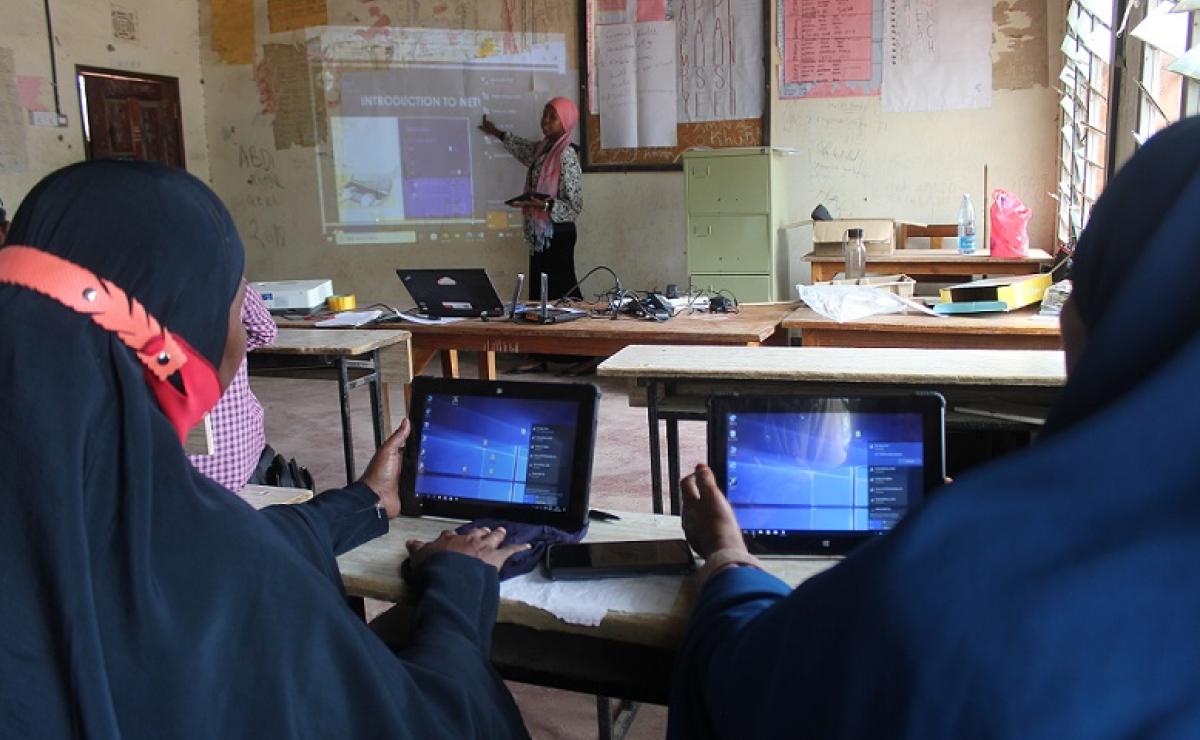Instant Network School – Transforming learning through Information Communication Technology

Training teachers at Hagadera Central Primary School on latest trends and advancements in information, communication and technology enables them to impart quality instruction to learners. Photo: LWF
From learning how to code to learning how to better collaborate across teams and with their instructors’, technology is empowering students to be more creative and be more connected. Instant Network Schools (INS) project sponsored by Vodafone foundation in partnership with UNHCR, is enriching education experience for young learners.
Built in 2014, INS entails 25 different tablets, projector and one laptop. The INS center has Wi-Fi internet which enables the teachers and learners to use various platform for educational gains. Our mission is to effectively address the gaps of education to young learners by bringing them closer to high quality learning. Since the introduction of INS program the school scored the best mean grade ever in Dadaab camps. There are 8 lesson in a day and 40 in week. The pupils are more interested in science subjects. “Science topics are practical and illustrative which arouses our motivation,” says one of the student leaders.
Participation in clubs and societies
There are several clubs in the school, with INS being one of the most active. Learners come together and deliberate matters of common interest in the school. The debating and inter-quiz club is popular among learners in the school. It would be more effective to install glass on the windows and put up curtains as these would prevent direct exposures to sun light.
The debate club uses the INS centers to research their topics, they also conduct rehearsals watching debates from other schools. They learn how to express themselves in public and gain confidence as a result. The use of Information, Communication Technology (ICT) and equipment has been infused into teaching and learning process to enable learners to be innovative and be updated in the application of technology. This is not just in education but in other facets of life. It is an interesting moment for learners to use and utilize the INS lab. Most teachers agree that pupils do not forget lesson taught using ICT because it is enjoyable. There is more elaboration and better understanding, aiding in retention of information.
Teachers use the INS lab for lesson preparation, development of professional document and pupils’ assessment tools where they carry out continuous test and update the ministry guidelines and requirements. The INS Club members who have been actively participating different activity have received certificate awards recognising their exemplary service and dedication.
The community of Hagadera including parents believe that INS is a step forward for the development of children. The use of technology is a boost to learners’ academic talents. Remedial classes are agreed upon between learner and teacher to incorporate modalities of revising the lesson using the internet and its rich resource. The special learners also access online for remedial purpose this helps them to explore activities outside their classroom.
Transforming the learning experience
Established in 1994 in Hagadera, Central Primary School, has grown in leap and bounds and has currently enrolled a total of 2001 learners (1180 boys and 821 girls) and 22 teachers (19 males and 3 female). Learners have experienced improvement in term examination thanks to their interaction with new technologies. The school enrollment has increased and better retention of learners has been observed, influenced majorly by use of technology in education. “Technology gives pupils the opportunity to enhance interaction with their classmates and instructors and encourages collaboration,” says one of the learners’ representatives.
Indeed, technology transforms the learning experience. Pupils have access to an incredible amount of new opportunities. When technology is readily available and performing correctly, pupils are able to access the most up-to-date information quicker and easier than ever before.
Information and Communication Technology (ICT) is important in primary education because it enables learners to search for the information they need and to organise what they have found. As children progress through the school system, they become increasingly responsible for their own learning. Many believe that ICT needs to be better integrated into the curriculum to enable schools to produce computer literate and independent learners.

